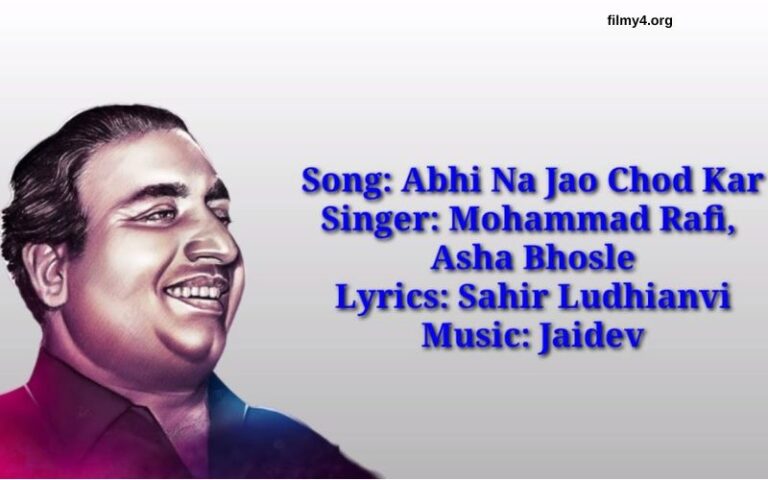“Abhi Na Jao Chhod Kar” is a timeless romantic song from the Bollywood film “Hum Dono” (1961), featuring the legendary playback singer Mohammed Rafi and actress Sadhana. The song’s lyrics were penned by Sahir Ludhianvi, while the music was composed by Jaidev.
Here are the lyrics in English
Please don't leave me now, my heart isn't yet satisfied
You have just arrived like the spring, please stay, please stay
Please do this much, just wait a bit
We too will wait for you
Please don‘t leave me now, my heart isn‘t yet satisfied
Those nights, those memories
Those meetings, those conversations, those pillow talks
Unreasonable desires, an unreasonable connection
Oh, for no reason, so many, so many unreasonable ones
Oh, for no reason, so many, so many unreasonable ones
Please don‘t leave me now, my heart isn‘t yet satisfied
This song beautifully captures the emotions of love, longing, and reluctance to part ways, making it a beloved classic that continues to resonate with audiences even today.
- Introduction to Mohammed Rafi’s iconic status in Indian music.
- Overview of the song “Abhi Na Jao Chhod Kar” and its enduring popularity across generations.
- 1.Historical Context and Creation:
- Background on the film “Hum Dono” (1961) and its significance in Bollywood.
- Role of composer Jaidev and his unique musical style.
- Insight into the lyrical prowess of Sahir Ludhianvi, the poet behind the song.
2. Deconstructing the Lyrics:
- Detailed analysis of the song’s lyrics, line by line.
- Exploration of themes such as love, separation, and emotional vulnerability.
- Interpretation of poetic devices and metaphors used by Ludhianvi.
3. Musical Composition and Arrangement:
- Examination of Jaidev’s musical composition and orchestration.
- Analysis of instrumental accompaniment and melodic structure.
- Impact of Mohammed Rafi’s vocal rendition and emotive expression.
4. Cultural Impact and Legacy:
- Initial reception of “Abhi Na Jao Chhod Kar” and its public response.
- Evolution of the song’s popularity over the decades.
- Its status as a timeless romantic classic in Indian cinema.
5. Cover Versions and Adaptations:
- Notable cover versions by contemporary artists and singers.
- Influence of the song on subsequent generations of musicians.
- Global recognition and cross-cultural appeal of the song.
6. Societal Relevance and Emotional Appeal:
- Examination of why the song resonates with listeners of all ages.
- Discussion on its emotional depth and universal themes.
- Role of nostalgia in maintaining its cultural relevance.
7. Cinematic and Visual Aesthetic:
- Scene analysis from “Hum Dono” featuring the song.
- Impact of visuals on enhancing lyrical meaning and emotional resonance.
- Relationship between music, lyrics, and cinematic storytelling.
8. Personal Reflections and Anecdotes:
- Stories and anecdotes related to personal experiences with the song.
- Impact of “Abhi Na Jao Chhod Kar” on individual listeners.
- Memorable performances and live renditions that have left a lasting impression.
9. Mohammed Rafi’s Legacy and Contribution:
- Overview of Mohammed Rafi’s illustrious career and vocal versatility.
- Analysis of his collaboration with lyricists and composers.
- Legacy of Mohammed Rafi as a cultural icon and musical legend.
Conclusion:
- Recap of Mohammed Rafi’s enduring legacy in Indian music.
- Reflection on the timeless charm and emotional depth of “Abhi Na Jao Chhod Kar.”
- Final thoughts on the song’s cultural significance and universal appeal.
